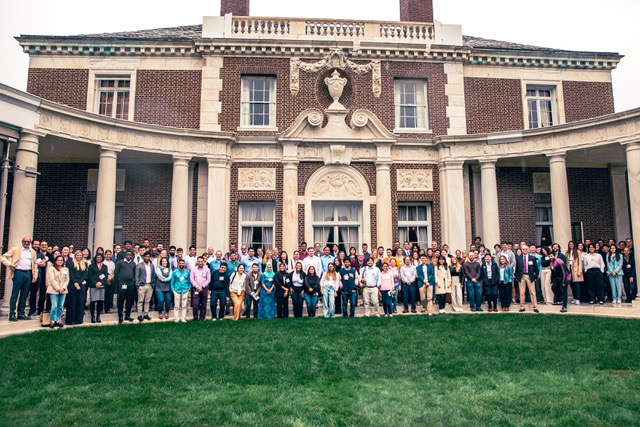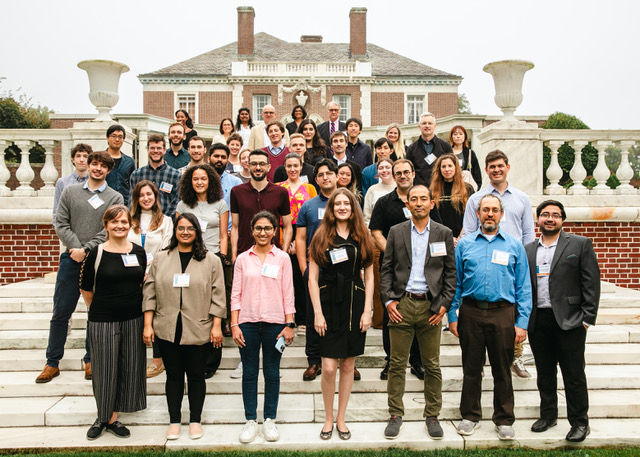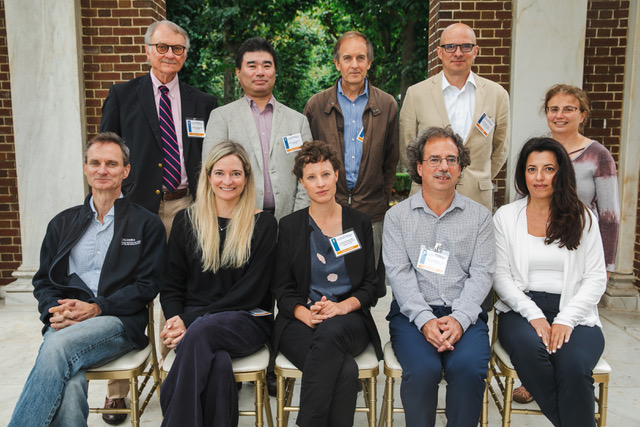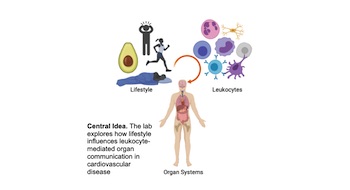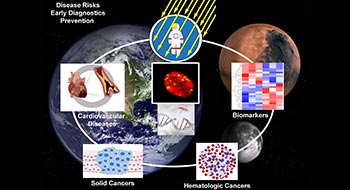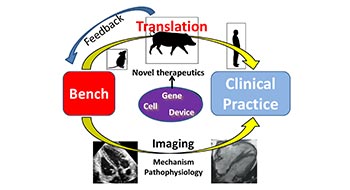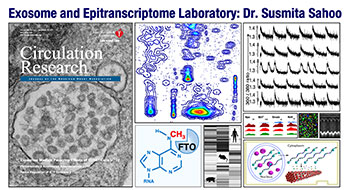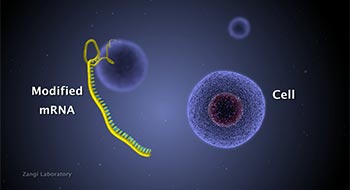We are hiring faculty! If you are interested, please e-mail Dr. Christopher Chan and Dr. Filip Swirski with your cover letter and CV.
Please click here to access the CVRI intranet for CVRI members
Pioneering, multidisciplinary, and collaborative. The Cardiovascular Research Institute (CVRI) at Mount Sinai, under the auspices of Mount Sinai Fuster Heart Hospital, is committed to elucidating the workings of the heart and blood in the broader physiological context.
The cardiovascular system is part of an intricate network that involves many tissue, cellular, and molecular processes. The immune, endocrine, metabolic, and hematopoietic systems, just to name a few—all play a role in our cardiovascular health. Understanding the mechanisms of inter-system communication is key to innovation in fundamental and translational science.
Promoting an Organic Exchange of Knowledge and Discovery
Just as the heart cannot be understood in isolation, our Institute cannot thrive in isolation. We collaborate with other research entities to grow our understanding of the body in its larger context. We are establishing relationships with researchers within the Mount Sinai community, with other New York cardiovascular institutes, and with numerous national and international organizations. We actively share our knowledge, insights, and discoveries, and draw inspiration and momentum from the work of our colleagues.
Latest CVRI Publications!
This list is updated periodically with the important senior authored publication from primary CVRI labs.
Targeting and tracking mRNA lipid nanoparticles at the particle, transcript and protein level. Kang, D.D., Marks, A., Morla-Forch, J., Dong, Y., Brown, B.D. & Teunissen, A.J.P. Nat. Biomed. Eng. 2025. https://doi.org/10.1038/s41551-025-01511-8
Long-term Pathway Activation in Cardiac Ventricular Tissues after Gamma and simGCRsim Irradiation. Khachatryan, G., Sirunyan, T., Hakobyan, S., Davitavyan, S., Zakharyan, R., Stepanyan, A., Brojakowska, A., Khlagtian, M.K., Bisserier, M., Zhang, S., Goukassian, D.A. and Arakelyan, A. Radiat Res. 2025 Sep 25. doi: 10.1667/RADE-25-00043.1. Online ahead of print.
Immune system influence on physiology. Nahrendorf, M., Ginhoux, F., and Swirski, F.K. Science. 2025 Aug 7;389(6760):594-599.
The effects of space radiation on the transcriptome of heart right ventricle tissue. Zakharyan, R., Hakobyan, S., Brojakowska, A., Bisserier, M., Zhang, S., Khlgatian, M.K., Rai, A.K., Davitavyan, S., Stepanyan, A., Sirunyan, T., Khachatryan, G., Sahoo, S., Garikipati, V.N.S., Arakelyan, A., Goukassian, D.A. NPJ Microgravity. 2025 Jul 21;11(1):46. doi: 10.1038/s41526-025-00506-8. PMID: 40691149
Multiplexed imaging of radionuclides. Soultanidis, G., Herraiz, J.L., Fayad, Z.A., Grimm, J. & Teunissen, A.J.P. Nat Biomed Eng.2025. https://doi.org/10.1038/s41551-025-01406-8
Radiolabeling lipoproteins to study and manage disease. Pérez-Medina, C., Fisher, E.A., Fayad, Z.A., Mulder, W.J.M., Teunissen, A.J.P. Eur J Nucl Med Mol Imaging. 2025 April 28. https://doi.org/10.1007/s00259-025-07281-4
Myelopoiesis is temporally dynamic and is regulated by lifestyle to modify multiple sclerosis. Yates, A.G., Khamhoung, A., Gaebel, L., Jacob, W., Radford-Smith, D.E., Kiss, M.G., Huynh, P., Gerhardt, T., Heiser, M., Cohen, O., Swirski, F.K., Anthony, D.C., Sumowski, J., Sand, I.K., McAlpine, C.S. Nature Communications. 2025 Apr 17;3683
Long-lasting sex-specific alteration in left ventricular cardiac transcriptome following gamma and simGCRsim radiation. Zakharyan, R., Hakobyan, S., Brojakowska, A. Davitavyan, S., Stepanyan, A., Siruyan, T., Khachatryan, G., Khlagtian, M.K., Bisserier, M., Zhang, S., Sahoo, S., Hadri, L., Garikipati, V.N.S., Arakelyan, A. & Goukassian, D.A.. Sci Rep 15, 5963 (2025).
Evaluating sex-specific responses to western diet across the lifespan: impact on cardiac function and transcriptomic signatures in C57BL/6J mice at 530 and 640/750 days of age.Stepanyan, A.*, Brojakowska, A.*, Zakharyan, R., Hakobyan, S., Davitavyan, S., Sirunyan, T., Khachatryan, G., Khlgatian, M.K., Bisserier, M., Zhang, S., Sahoo, S., Hadri, L., Rai, A., Garikipati, V.N.S., Arakelyan, A., Goukassian, D. Cardiovasc. Diabetol. 2024 Dec 28;23(1):454.
Myocardial infarction augments sleep to limit cardiac inflammation and damage. Huynh, P. Hoffmann, J.D., Gerhardt, T., Kiss, M.G., Zuraikat, F.M., Cohen, O., Wolfram, C., Yates, A.G., Leunig, A., Heiser, M., Gaebel, L., Gianselli, M., Goswami, S., Khamhoung, A., Downey, J., Yoon, S., Chen, Z., Roudko, V., Dawson, T., da Silva, J.F., Ameral, N.J., Morgenroth-Rebin, J., D'Souza, D., Koekkoek, L.L., Jacob, W., Munitz, J., Lee, D., Fullard, J.F., van Leent, M.M.T., Roussos, P., Kim-Schulze, S., Shah, Neomi, S., Kleinstiver, B.P., Swirski, F.K., Leistner D., St-Onge M-P. & McAlpine, C.S. Nature. 2024 30 October:https://doi.org/10.1038/s41586-024-08100-w
Transcriptome wide changes in long noncoding RNAs in diabetic ischemic heart disease. Rai AK, Muthukumaran NS, Nisini N, Lee T, Kyriazis ID, de Lucia C, Piedepalumbo M, Roy R, Uchida S, Drosatos K, Bisserier M, Katare R, Goukassian D, Kishore R, Garikipati VNS. Cardiovasc Diabetol. 2024 Oct 17;23(1):365.
Inhibition of endothelial to mesenchymal transition in a large animal preclinical arterio-venous fistula model leads to improved remodeling and reduced stenosis. Xu Y, Korayem A, Cruz-Solbes AS, Chandel N, Sakata T, Mazurek R, Mavropoulos SA, Kariya T, Aikawa T, Yamada KP, D'Escamard V, V'Gangula B, Baker AH, Ma L, Björkegren JLM, Fuster V, Boehm M, Fish KM, Tadros R, Ishikawa K, Kovacic J. Cardiovasc Res. 2024 Jul 26:cvae157. doi: 10.1093/cvr/cvae157.
Integrative gene regulatory network analysis discloses key driver genes of fibromuscular dysplasia. d'Escamard V, Kadian-Dodov D, Ma L, Lu S, King A, Xu Y, Peng S, V Gangula B, Zhou Y, Thomas A, Michelis KC, Bander E, Bouchareb R, Georges A, Nomura-Kitabayashi A, Wiener RJ, Costa KD, Chepurko E, Chepurko V, Fava M, Barwari T, Anyanwu A, Filsoufi F, Florman S, Bouatia-Naji N, Schmidt LE, Mayr M, Katz MG, Hao K, Weiser-Evans MCM, Björkegren JLM, Olin JW, Kovacic JC. Nat Cardiovasc Res. 2024 Sep;3(9):1098-1122.
Rezdiffra™ (resmetirom): a THR-β agonist for non-alcoholic steatohepatitis. Brisnovali, N.F., Haney, C., Goedeke, L. Trends Pharmacol Sci. 2024. Sep 19:S0165-6147(24)00184-6.
Uncovering atherosclerotic cardiovascular disease by PET imaging. Maier, A. Teunissen, A.J.P., Nauta, S.A., Lutgens, E., Fayad, Z.A., van leent, M.M.T. Nat Rev Cardiol. 2024;21:632-651.
Cortico-limbic interactions and carotid athersclerotic burden during chronic stress exposure. Gharios C., van Leent M.M.T., Chang H.L., Abohashem S., O'Connor D., Osborne, M.T., Tang C.Y., Kaufman, A.E., Robson, P.M., Ramachandran, S., Calcagno, C., Mani, V., Trivieri, M.G., Seligowski, A.V., Dekel, S., Mulder, W.J.M., Murrough, J.W., Shin, L.M., Tawakol, A. and Fayad, Z.A. Eur Heart J. 2024. May 21;45(19):1753-1764.
Neuroimmune circuits in the plaque and bone marrow regulate atherosclerosis. Gerhardt T., Huynh P., McAlpine C.S. Cardiovasc Res. 2024. Aug 1:cvae167. doi: 10.1093/cvr/cvae167.
Role of mitochondrial ribosomal protein L7/L12 (MRPL12) in diabetic ischemic heart disease. Rai AK, Sanghvi S, Muthukumaran NS, Chandrasekera D, Kadam A, Kishore J, Kyriazis ID, Tomar D, Ponnalagu D, Shettigar V, Khan M, Singh H, Goukassian D, Katare R, Garikipati VNS. Free Radic Biol Med. 2024 Jul 6;222:531-538.
Simulated Microgravity Alters Gene Regulation Linked to Immunity and Cardiovascular Disease. Tahimic, C.G.T.; Steczina, S.; Sebastian, A.; Hum, N.R.; Abegaz, M.; Terada, M.; Cimini, M.; Goukassian, D.A.; Schreurs, A.-S.; Hoban-Higgins, T.M.; et al. Genes 2024, 15, 975.
Recessive TMOD1 mutation causes childhood cardiomyopathy.Vasilescu C, Colpan M, Ojala TH, Manninen T, Mutka A, Ylänen K, Rahkonen O, Poutanen T, Martelius L, Kumari R, Hinterding H, Brilhante V, Ojanen S, Lappalainen P, Koskenvuo J, Carroll CJ, Fowler VM, Gregorio CC*, Suomalainen A Commun Biol. 2024 Jan 2;7(1):7. doi: 10.1038/s42003-023-05670-9.PMID: 38168645 *Corresponding Author
A nemaline myopathy-linked mutation inhibits the actin-regulatory functions of tropomodulin and leiomodin.Schultz LE, Colpan M, Smith GE Jr, Mayfield RM, Larrinaga TM, Kostyukova AS, Gregorio CC. Proc Natl Acad Sci U S A. 2023 Nov 21;120(47):e2315820120. doi: 10.1073/pnas.2315820120. Epub 2023 Nov 13.PMID: 37956287
Lifetime evaluation of left ventricular structure and function in male ApoE null mice after gamma and space-type radiation exposure. Brojakowska A, Jackson CJ, Bisserier M, Khlgatian MK, Jagana V, Eskandari A, Grano C, Blattnig SR, Zhang S, Fish KM, Chepurko V, Chepurko E, Gillespie V, Dai Y, Kumar Rai A, Garikipati VNS, Hadri L, Kishore R, Goukassian DA. Front Physiol. 2023 Nov 20;14:1292033. doi: 10.3389/fphys.2023.1292033.
Nanotherapeutic Heterogeneity: Sources, Effects, and Solutions. Morla-Forch, J., Ranzenigo, A., Fayad, Z.A., Teunissen, A. Dec 2023. Nano Micro Small. https://doi.org/10.1002/smll.202307502
Effects of lifestyle factors on leukocytes in cardiovascular health and disease. Janssen, H., Koekkoek, L.L., Swirski, F.K. Sept 2023. Nature Reviews Cardiology. doi: 10.1038/s41569-023-00931-w.
The ISMMS Scholars Portal
Cardiovascular Research Institute on the Icahn School of Medicine Scholars Portal
The ISMMS Scholars Portal tracks publications and other kinds of research output, people, projects and grants, research units (departments, institutions, centers), datasets, and research-related activities within the CVRI.
CVRI @ 3rd Annual NYC Inter-Institutional Cardiovascular Research Series!
Mount Sinai and the CVRI joined their colleagues from New York Institute of Technology (NYIT), New York Medical College, CUNY, Columbia University, NYU Langone Health, Rutgers NJ Medical School, Albert Einstein College of Medicine, and Weill Cornell on September 26th, 2024 at the NYIT de Seversky Mansion for a great retreat! Thank you to all involved for the wonderful opportunity to connect with fellow scientists in the area and for the wonderful day of connections and excellent talks and posters.
